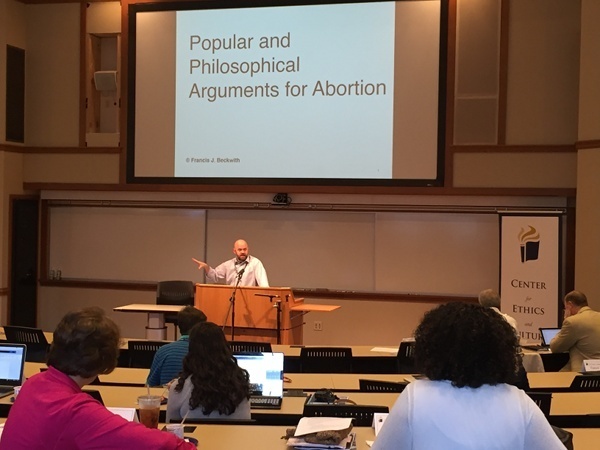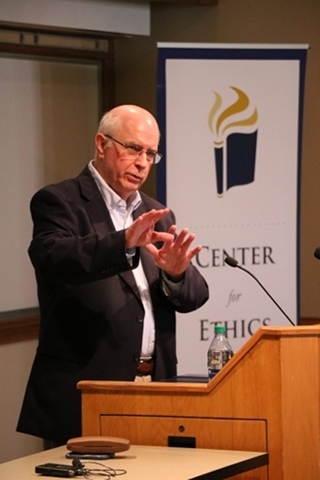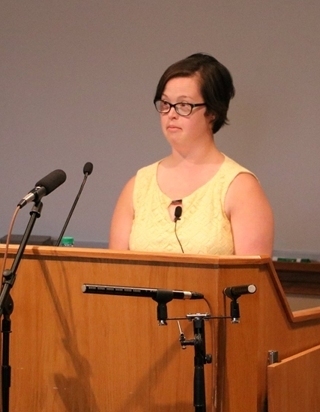
Current and future pro-life leaders from North America, South America, and Europe gathered on the campus of the University of Notre Dame for a week-long "pro-life boot camp" at the Center for Ethics and Culture's annual Vita Institute, June 18-25. Participants studied the fundamentals of life issues with world-renowned scholars across a wide range of disciplines including social science, biology, philosophy, theology, law, neonatology, and fertility counseling.
The 28 participants in this year's Vita Institute included research scholars, constitutional legal theorists, impact litigators, promoters of human rights, family planning counselors, pro-life grassroots organizers, health care system directors, post-abortion healing ministers, bioethicists, diocesan pro-life staffers, and multimedia producers. They hailed from across the U.S., Colombia, and Austria. Participants were active on social media throughout the week, using the hashtag #NDVita2016 on both Facebook and Twitter.
"The Vita Institute is one of our most important and most effective initiatives for building a culture of life worldwide," said Carter Snead, director of the Center for Ethics and Culture and Notre Dame Law School professor. "This year’s participants were extraordinary and inspiring leaders from all corners of the pro-life movement. They were joined by a world class faculty featuring some new additions drawn from Harvard, Duke, Stanford, and Northwestern."

The Vita Institute presents comprehensive interdisciplinary training meant to make the world’s pro-life leaders more effective in their work as litigators, health care providers, community organizers, and counselors. Now in its eighth year, Vita Institute alumni include the senior leaders of the most high profile and important pro-life organizations from around the world, grassroots activists, and concerned citizens from across the full spectrum of pro-life vocations. The Vita Institute gives current and emerging pro-life leaders opportunities to deepen their intellectual and spiritual lives and to foster lasting relationships with others who share their commitment to the cause for life.
The faculty at this year's Institute represented a diverse range of fields and institutions. Dr. Frank Beckwith, professor of philosophy at Baylor University, led off with a discussion of the philosophical dimensions of the pro-life debate, followed by Dr. William Hurlbut, M.D. of Stanford Medical School, who discussed embryology and controversial new forms of genetic modification. Director Carter Snead covered the legal dimensions, with lectures on abortion jurisprudence; the law, ethics, and public policy of embryo research; and the law and policy of assisted suicide, euthanasia, and end-of-life decisionmaking. Dr. Monique Chireau of Duke University Medical School addressed the epidemiological evidence comparing the safety of abortion and childbirth, followed by Richard Doerflinger, recently retired as head of pro-life efforts for the US Conference of Catholic Bishops (USCCB), who drew upon his vast experience to offer advice on pursuing pro-life public policies at the state and federal levels. Rev. Peter Ryan, S.J. of the USCCB spoke about abortion in the teachings of St. John Paul II and St. Thomas Aquinas. Notre Dame's Daniel Philpott spoke on the spread of abortion rights internationally, and Dr. Gilbert Meilaender (pictured, left), Paul Ramsey Fellow of the CEC, spoke on adoption and family life.

The second part of the week included Rev. Michael Sherwin, O.P. of the University of Fribourg, Switzerland, who presented on the theological foundations of the culture of life. Political scientist Dr. Michael J. New offered a deep dive into the social science and opinion data on life issues. Dr. Jacqueline and the Rev. Eugene Rivers, founders of the Seymour Institute for Black Church and Policy Studies, spoke on abortion, poverty, and racial discrimination. Suzy Younger of St. Joseph FertilityCare discussed life affirming forms of reproductive health care. Dr. Mary O'Callaghan, a Public Policy Fellow of the Center and disability advocate, discussed prenatal diagnosis of disability, its challenges to parents, and its threat to unborn children with disabilities. The most inspiring presentation of the week came from Katie Shaw (pictured, right), a young woman with Down Syndrome, who offered a stirring, witty, and moving account of how much she loves her full and busy life. The concluding lecture from director Carter Snead addressed fetal pain laws, potential future legislative efforts, and the 2016 presidential election.
During the week, participants had time to pray together at daily Mass, build community over meals in the campus dining hall, and to see pro-life work in action as they learned best practices and networked during site visits to the award-winning Women’s Care Center of South Bend and the maternal group home Hannah’s House.
In July, the Center for Ethics and Culture will travel (at the invitation of Archbishop José Gomez) to conduct a mini-Vita Institute for pro-life leaders in the Archdiocese of Los Angeles. Next year's full Vita Institute will take place on the campus of Notre Dame in June 2017. More information about the Vita Institute program is available here.
